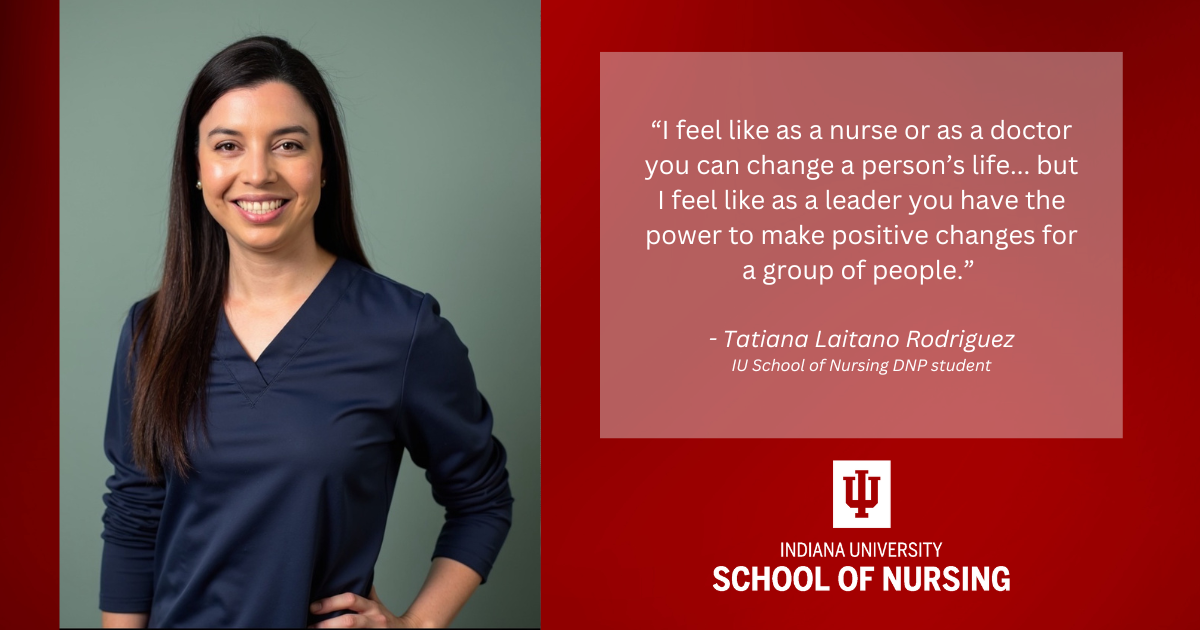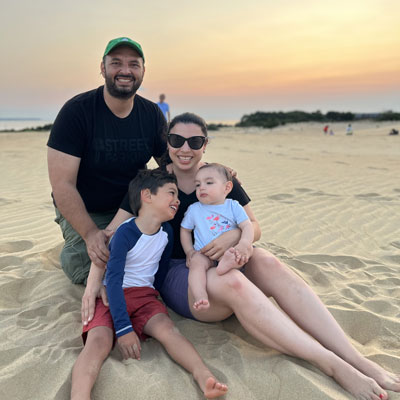Leadership is often thought of as an innate ability, but IU School of Nursing DNP student Tatiana Laitano Rodriguez understands that leadership is an acquired skill.
“You are not born a leader, you have to learn how to handle every situation, how to be emotionally intelligent, and I think the Doctor of Nursing Practice program has focused on making us develop those skills,” she said.
Now in her final year of the DNP Executive Leadership track—a post-MSN program designed to prepare nurses for high-level administrative and management roles—Laitano Rodriguez is refining the leadership abilities she first began cultivating as a physician in her home country of Honduras.
Before moving to the United States, she served four years in medicine and held several leadership positions, including director of a maternity clinic, director of Honduras’s first primary care project, and Chief of Medical Services at the Honduran Red Cross blood bank.
While training for her leadership role at the Red Cross, Laitano Rodriguez spent about 6 months learning every staff role, so she was better equipped with the knowledge to successfully supervise them.
“I think I also gained respect that way because I was going through every position in the blood bank,” she said. “I learned how to be a leader there.”
Laitano Rodriguez and her husband, also a physician, relocated from Honduras to Indiana so he could complete a residency at IU Health Methodist Hospital. To remain in the same city as her husband, Laitano Rodriguez decided to transition to nursing.


Her decision to pursue a career in leadership is not one she would have anticipated before finding herself in leadership roles as a physician. In fact, she took a break from leadership to work as a research assistant at the IU School of Medicine, but she missed the challenge.
“I missed my leadership track that I had before, and it wasn’t something that I think I wanted when I was young, I just got thrown into this job, they offered it. I had to learn how to be a leader and to love it,” Laitano Rodriguez said.
She grew to love being a leader because of the change she was able to make for her staff and the patients they treated.
“I feel like as a nurse or as a doctor you can change a person's life... but I feel like as a leader you have the power to make positive changes for a group of people,” she said.
Laitano Rodriguez has already played a significant role in some of these large-scale changes through her research with Jennifer Embree, DNP, RN, chief wellness officer at the IU School of Nursing. The two are working on a number of research projects related to professional identity in nursing, nurse safety and happiness, and possible improvements that can be made in the workplace to create a better environment.
For example, Embree explained that a survey of more than 1,500 nurses found that nurses do not feel they have good self-care or conflict resolution skills, which matches national research trends. Their survey was first distributed at an April 2025 Professional Identity in Nursing workshop and later expanded to social media to reach a larger pool of nurses.
Through their research, Embree and Laitano Rodriguez have been able to offer solutions, such as incorporating wellness activities into conferences to teach nurses how to better care for themselves. Some local hospitals now offer employees free access to mindfulness apps, such as Calm. Embree and Laitano have also been working on increasing awareness of these resources.
By conducting this research on issues facing nurses, Laitano Rodriguez gained valuable insight as a nursing leader. She has knowledge of both the challenges facing the nursing profession and the solutions being proposed to solve them.
Laitano Rodriguez said she brings a unique perspective to her work and can propose more creative solutions due to her past experience of working with limited resources in Honduras.
“I feel like I also think differently, like you can do this without this technology because I have that training back home,” she explained. “I think that’s also an advantage that I can think out of the box.”
Embree sees this unique perspective as a strength of Laitano Rodriguez’s leadership.
“Nursing is a different world than medicine, but I think it informs both," Embree said. “She’s very logical, she’s very relationship-focused, but she’s also strategic and always planning.”
One of the highlights of the Executive Leadership track is the opportunity to shadow nursing leaders in the healthcare system, which is important, Laitano Rodriguez said.
“It’s just a complete program with every single part of healthcare that you might think of involved. That’s what separates IU from other programs I’ve trained.”

